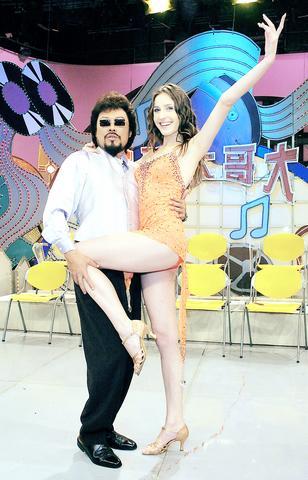Margarita Laurouskaya (
Well, a mermaid, actually. She came to Taiwan about four years ago from Belarus Athletic University along with a few classmates to join a team of synchronized swimmers that would perform nightly shows at a Taichung theme park that might be better described as a burlesque.

PHOTO: TAIPEI TIMES
Troupes of girls predominantly from former Soviet bloc states -- jin si mao (

PHOTO: TAIPEI TIMES
"My mother was working in a company where she could check all about the place where I was supposed to work and about Taiwan," she said in an interview this week. "She did a lot of checking and felt it was a legitimate show. So I came."
She and her classmates chose to abandon their university studies because the show would have them earning more in six months than they'd make in a year in Belarus. And so Margarita became a mermaid and had her picture blown up large on the show's poster.
"It was easy," she said of her experience in the show. "In Belarus we train to do this from when we're little and now we can do it here and make money. We don't have this kind of stuff in my country. We just do championship stuff. So everyone looks for work at water parks in Japan, France, America ? and Taiwan."
But after eight months in a scaly Spandex mermaid suit, Margarita was swum out. She returned to Belarus for about six months but decided her prospects were better back in Taiwan.
"I didn't want to jump from here ? to here," she said using her hands to indicate a precipitous drop.
But success in Taiwan meant having to learn the language. She'd met an agent, Kelly Chin (金玉珮), who said she could get her on television if she could speak Chinese. So Margarita holed-up in her apartment, leaving only to eat, attend Chinese class and for occasional modeling assignments. The rest of the time she spent watching television -- not for entertainment as much as education.
"I would really listen to what they were saying. This is how I learned Chinese," she said. "But you can't just learn the language, you have to learn the culture too."
Her break came a year later when Apple Daily (蘋果日報) ran a full-page pictorial on synchronized swimming that featured her. Taiwan's popular television host, Chang Fei (張菲), got one look at Margarita the mermaid and reeled her in.
She's been swimming, dancing and donning an endless array of bikinis on Chang's show every week since the beginning of this year -- earning a reported NT$200,000 a month for her troubles -- and was rumored to have danced her way into Chang's heart.
So is there anything going on between she and Chang?
"No."
Isn't he interested in her?
"I don't know," she said, then turned to ask her agent, Chin, who chaperoned her interview. "Is Chang Fei interested in me?"
"He's that way with all the girls," Chin says.
What about the guy Next magazine surreptitiously photographed her with? Margarita managed to look coy in a leopard-print bikini on the magazine's cover two weeks ago and an inside expose showed pictures of her with her "boyfriend" -- a guy far younger and less hirsute than Chang.
"That's my roommate," she explains. "Next magazine and Apple Daily followed me for two weeks trying to find something to write about. But there isn't anything. I'm too busy to have a boyfriend. I don't have time to go out."
Her schedule is taken up, she says, by taping Chang's show on Tuesdays, meeting to decide the content of the next week's show on Friday, and spending all weekend preparing for it. Rehearsals can be all-consuming. Weeks ago, she had to rent a gu zhen (
"The rest of the week, I have modeling shoots and press conferences," she said. "And I have a biography coming out later this month. It's all ready, except for the photos."
But for all the time she spends wearing bikinis in front of cameras, Margarita doesn't consider herself a professional model. Her job, she says, is simply to entertain people.
"I tried doing the serial television programs," she said, "but filming those shows isn't fun. I think you should have fun doing the show. The audience will see that and they'll have fun too."
It's a good philosophy, gauging by the reaction of people who watch her every week.
"Her ballet maybe isn't very professional, but it looks great on television!" said one avid watcher. "She's great because she comes across as nice and sweet and you can tell she really likes Taiwan."
Her goal, she says, is to host a television program of her own, but she doesn't rule out getting involved in film either.
"I just want to be a part in something that is quality," she said, emphasizing the word "part."
Asked if she's afraid that her fame is fleeting, Margarita reveals a side to her personality that likely helped gain her fame in the first place.
"Of course, all this won't last," she said smiling. "But I'm happy and feel very lucky for everything that has happened. I can always teach kids how to swim."

The People’s Republic of China (PRC) invaded Vietnam in 1979, following a year of increasingly tense relations between the two states. Beijing viewed Vietnam’s close relations with Soviet Russia as a threat. One of the pretexts it used was the alleged mistreatment of the ethnic Chinese in Vietnam. Tension between the ethnic Chinese and governments in Vietnam had been ongoing for decades. The French used to play off the Vietnamese against the Chinese as a divide-and-rule strategy. The Saigon government in 1956 compelled all Vietnam-born Chinese to adopt Vietnamese citizenship. It also banned them from 11 trades they had previously

Growing up in a rural, religious community in western Canada, Kyle McCarthy loved hockey, but once he came out at 19, he quit, convinced being openly gay and an active player was untenable. So the 32-year-old says he is “very surprised” by the runaway success of Heated Rivalry, a Canadian-made series about the romance between two closeted gay players in a sport that has historically made gay men feel unwelcome. Ben Baby, the 43-year-old commissioner of the Toronto Gay Hockey Association (TGHA), calls the success of the show — which has catapulted its young lead actors to stardom -- “shocking,” and says

Jan. 12 to Jan. 18 At the start of an Indigenous heritage tour of Beitou District (北投) in Taipei, I was handed a sheet of paper titled Ritual Song for the Various Peoples of Tamsui (淡水各社祭祀歌). The lyrics were in Chinese with no literal meaning, accompanied by romanized pronunciation that sounded closer to Hoklo (commonly known as Taiwanese) than any Indigenous language. The translation explained that the song offered food and drink to one’s ancestors and wished for a bountiful harvest and deer hunting season. The program moved through sites related to the Ketagalan, a collective term for the

Inside an ordinary-looking townhouse on a narrow road in central Kaohsiung, Tsai A-li (蔡阿李) raised her three children alone for 15 years. As far as the children knew, their father was away working in the US. They were kept in the dark for as long as possible by their mother, for the truth was perhaps too sad and unjust for their young minds to bear. The family home of White Terror victim Ko Chi-hua (柯旗化) is now open to the public. Admission is free and it is just a short walk from the Kaohsiung train station. Walk two blocks south along Jhongshan